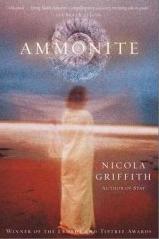
Ammonite
Nicola Griffith
386 pages
published in 1993
Nicola Griffith is a writer I've heard a great deal of but so far had never read anything by. Ammonite was her first novel and immediately made a strong impression on publication, winning both the James Tiptree Award and the Lambda Award. As these awards confirm, Ammonite is a classic feminist science fiction novel, straight in the tradition of writers like Ursula Le Guin (Left Hand of Darkness), Joanna Russ (The Female Man) and Sheri Tepper (The Gate to Women's Country).
The world created in Ammonite is also a classic feminist science fiction trope: that of a world without men. In this case, it's the colony world of Jeep where an alien virus killed off all men and a large percentage of women, leaving the survivors to rebuilt their societies on a one gender basis. How they've managed to do so is the central mystery of Ammonite, which is partially a puzzle story and partially a leisurely planetary romance as our protagonist, anthropologist Marghe Taishan, travels the planet in search of answers. Marghe is working for SEC, the government agency that was set up to safeguard the interests of indigenes of rediscovered colony worlds like Jeep from exploitation by the Company, which has a monopoly on space exploration and which whom Marghe has some unpleasant history...
Marghe was brought to Jeep to test a newly developed vaccine while establishing contact with the natives and finding out where they came from, what their origin is. This she hopes, might shed some light on what the virus is and how the women reproduce without men. She decides to travel north, as all the clues she has so far point that way. Her travels will bring her into contact with a wide variety of cultures and societies, many of which are barely aware of the existence of the Company's colony.
In a parallel secondary storyline the colony's commander, Hannah Danner, has come to realise that the existence of the virus means they'll never get off Jeep, except in the unlikely circumstance that a vaccine can be found. She also knows that there's a military ship in system with orders to do everything necessary to prevent the virus from leaving the planet. Therefore she starts to make the colony self-substaining, as well as integrate it in the planet's trade networks.
These separate plot threads are important, but mainly as excuse to showcase the world Griffith had created. Jeep is a fully realised world and the civilisations encountered by Marghe make sense, feel real. Nicola Griffith's goal was to create a world populated solely with women without falling back on cliches about what such a world would look like. No "seven-feet-tall vegetarian amazons who would never dream of killing anyone, no "aliens who are really women or women who are really aliens", but "the entire spectrum of human behavior". She succeeded quite well in this, due in great part to the matter of fact way in which she presents her world. Because Griffith trusts her readers to understand the setup, she doesn't constantly points out that "holy shit these are all women" and how strange this is. This makes the fact that all but one minor character are women just as normal as the far more usual opposite situation; nobody thinks it strange if a science fiction story features only male characters.
As for the central mystery of the story, why the virus killed all men but only one in five women and how a female-only, lowtech society manages to reproduce, it's solution isn't quite hard science fiction, even by the stretchable standards of much hard science fiction. It's somewhat mystical and if you're allergic to new agey woowoo, it might make you itch. Then again, Ammonite is quite clearly not meant to be a hard science fiction problem solving story. The focus lies elsewhere, on presenting a believable female-only world, on Marthe's personal growth and her rediscovery of herself as part of a community.
Nicola Griffith writes brilliantly, especially considering this is a first novel and in a style that makes you want to read on even when the most exciting thing she's telling you about is the planting of the new harvest. It's not often I discover a new first rate science fiction author, and I'm a bit miffed with myself for not having discovered her earlier.
Read more about:
Nicola Griffith,
Ammonite,
science fiction,
book review